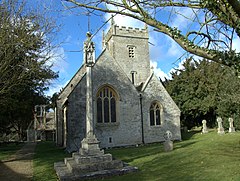Stanton Fitzwarren
| Stanton Fitzwarren | |
|---|---|
 St Leonard's church | |
Location within Wiltshire | |
| Population | 228 (in 2021)[1] |
| OS grid reference | SU1790 |
| Civil parish |
|
| Unitary authority | |
| Ceremonial county | |
| Region | |
| Country | England |
| Sovereign state | United Kingdom |
| Post town | Swindon |
| Postcode district | SN6 |
| Dialling code | 01793 |
| Police | Wiltshire |
| Fire | Dorset and Wiltshire |
| Ambulance | South Western |
| UK Parliament | |
| Website | Parish Council |
Stanton Fitzwarren is a village and civil parish 3 miles (4.8 km) north-east of Swindon, in Wiltshire, England. It is within the area of the unitary authority of Swindon.
Parish church
[edit]The Grade I listed[2] Church of England parish church of Saint Leonard has Norman origins:[3] the north and south doorways, the chancel arch and a window in the north wall survive from this period.[3] The cylindrical font is an important Norman sculpture depicting eight virtues, eight vices, the Church, the Evil One and a six-winged seraph.[3] The Norman building had an apse, of which the foundations were discovered during restoration work in 1865.[3] The chancel was rebuilt in the 14th century with a flat east wall and east window. The bell tower was added in 1631.[3]
St. Leonard's restoration (1865) was completed by the Gothic Revival architect J.W. Hugall. In 1891 the nave was lengthened westwards and the south porch was added.[3] During one of the 19th century rebuildings a new east window was inserted in the chancel and the 14th century one was re-used as the centrepiece of a folly in the grounds of Stanton House.[4] St. Leonard's parish is now part of a single Church of England benefice with the parishes of South Marston and Stratton St Margaret.[5]
Railway
[edit]The Swindon and Highworth Light Railway – from the Great Western Main Line at Swindon to Highworth – was built through Stanton Fitzwarren in 1879–81, although the original company was unable to open the line and sold it to the Great Western Railway (GWR) in 1882.[6] In 1883 the GWR finally opened the line to traffic, with three intermediate stations including one at Mill Lane, in the north of the village.[6][7]
Neither passenger nor goods traffic was high, but activity increased during both world wars. From 1916, timber was taken from Stanton Big Wood; and from the late 1930s the station provided access for the building of the aircraft factory at South Marston (later taken over by Vickers-Armstrongs), although this traffic ceased after a spur into the factory was built in the early 1940s. The station also served army camps in the area.[7]
British Railways withdrew passenger services in 1953, apart from workmen's trains that it continued to run until 1962.[6] Most of the line, including the section through Stanton, was then dismantled.[6]
Stanton House
[edit]Stanton House was built just south of the church in 1935, in traditional Cotswold style, for a New York businessman;[4] at the same time a 19th-century cottage at the north entrance to the site was repurposed as a lodge.[8] The house is now a hotel.[9]
Amenities
[edit]Stanton has a village hall.[10]
References
[edit]- ^ "Stanton Fitzwarren: population statistics, 2021 Census". CityPopulation.de. Retrieved 26 April 2023.
- ^ Historic England. "Church of St Leonard (1023408)". National Heritage List for England. Retrieved 7 February 2015.
- ^ a b c d e f Pevsner & Cherry, 1975, page 477
- ^ a b Pevsner & Cherry, 1975, page 478
- ^ A Church Near You: St Leonard, Stanton Fitzwarren
- ^ a b c d The Highworth Branch: Swindon & Highworth Light Railway: The Swindon & Highworth Light Railway - A History
- ^ a b Oakley, Mike (2004). Wiltshire Railway Stations. Wimbourne: The Dovecote Press. pp. 122–123. ISBN 1-904349-33-1.
- ^ Historic England. "Lodge and gate piers to Stanton House (1023410)". National Heritage List for England. Retrieved 21 October 2020.
- ^ "Stanton House Hotel". Retrieved 30 October 2021.
- ^ Stanton Fitzwarren, Swindon, Wiltshire: Village Hall
Sources
[edit]- Pevsner, Nikolaus; Cherry, Bridget (revision) (1975). The Buildings of England: Wiltshire. Harmondsworth: Penguin Books. pp. 477–478. ISBN 0-14-071026-4.

